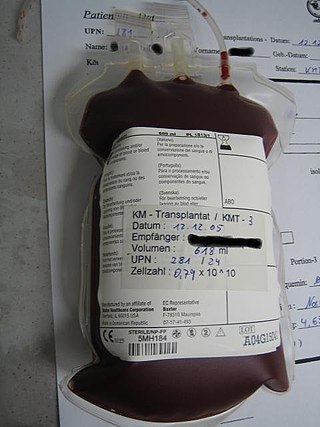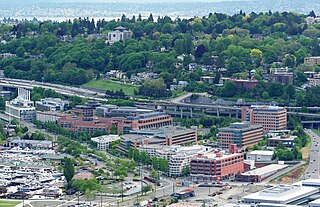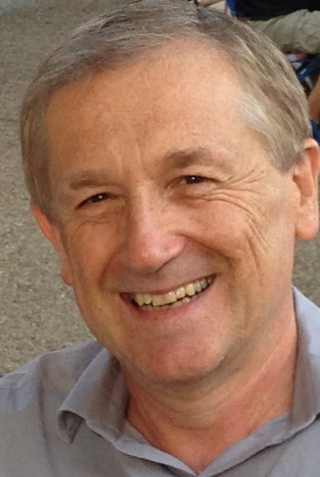Related Research Articles

Chronic lymphocytic leukemia (CLL) is a type of cancer in which the bone marrow makes too many lymphocytes. Early on, there are typically no symptoms. Later, non-painful lymph node swelling, feeling tired, fever, night sweats, or weight loss for no clear reason may occur. Enlargement of the spleen and low red blood cells (anemia) may also occur. It typically worsens gradually over years.
Anti-thymocyte globulin (ATG) is an infusion of horse or rabbit-derived antibodies against human T cells and their precursors (thymocytes), which is used in the prevention and treatment of acute rejection in organ transplantation and therapy of aplastic anemia due to bone marrow insufficiency.

Hematopoietic stem-cell transplantation (HSCT) is the transplantation of multipotent hematopoietic stem cells, usually derived from bone marrow, peripheral blood, or umbilical cord blood, in order to replicate inside a patient and produce additional normal blood cells. HSCT may be autologous, syngeneic, or allogeneic.

Graft-versus-host disease (GvHD) is a syndrome, characterized by inflammation in different organs. GvHD is commonly associated with bone marrow transplants and stem cell transplants.

The Fred Hutchinson Cancer Center, formerly known as the Fred Hutchinson Cancer Research Center and also known as Fred Hutch or The Hutch, is a cancer research institute established in 1975 in Seattle, Washington.

Cell therapy is a therapy in which viable cells are injected, grafted or implanted into a patient in order to effectuate a medicinal effect, for example, by transplanting T-cells capable of fighting cancer cells via cell-mediated immunity in the course of immunotherapy, or grafting stem cells to regenerate diseased tissues.
Stem-cell therapy uses stem cells to treat or prevent a disease or condition. As of 2024, the only FDA-approved therapy using stem cells is hematopoietic stem cell transplantation. This usually takes the form of a bone marrow or peripheral blood stem cell transplantation, but the cells can also be derived from umbilical cord blood. Research is underway to develop various sources for stem cells as well as to apply stem-cell treatments for neurodegenerative diseases and conditions such as diabetes and heart disease.
Lymphomatoid granulomatosis (LYG or LG) is a very rare lymphoproliferative disorder first characterized in 1972. Lymphomatoid means lymphoma-like and granulomatosis denotes the microscopic characteristic of the presence of granulomas with polymorphic lymphoid infiltrates and focal necrosis within it.
Juvenile myelomonocytic leukemia (JMML) is a rare form of chronic leukemia that affects children, commonly those aged four and younger. The name JMML now encompasses all diagnoses formerly referred to as juvenile chronic myeloid leukemia (JCML), chronic myelomonocytic leukemia of infancy, and infantile monosomy 7 syndrome. The average age of patients at diagnosis is two (2) years old. The World Health Organization has included JMML as a subcategory of myelodysplastic and myeloproliferative disorders.
Donor lymphocyte infusion (DLI) or buffy coat infusion is a form of adoptive immunotherapy used after hematopoietic stem cell transplantation.
Transplantable organs and tissues may refer to both organs and tissues that are relatively often transplanted, as well as organs and tissues which are relatively seldom transplanted. In addition to this it may also refer to possible-transplants which are still in the experimental stage.
An inflammatory cytokine or proinflammatory cytokine is a type of signaling molecule that is secreted from immune cells like helper T cells (Th) and macrophages, and certain other cell types that promote inflammation. They include interleukin-1 (IL-1), IL-6, IL-12, and IL-18, tumor necrosis factor alpha (TNF-α), interferon gamma (IFNγ), and granulocyte-macrophage colony stimulating factor (GM-CSF) and play an important role in mediating the innate immune response. Inflammatory cytokines are predominantly produced by and involved in the upregulation of inflammatory reactions.
Graft-versus-tumor effect (GvT) appears after allogeneic hematopoietic stem cell transplantation (HSCT). The graft contains donor T cells that can be beneficial for the recipient by eliminating residual malignant cells. GvT might develop after recognizing tumor-specific or recipient-specific alloantigens. It could lead to remission or immune control of hematologic malignancies. This effect applies in myeloma and lymphoid leukemias, lymphoma, multiple myeloma and possibly breast cancer. It is closely linked with graft-versus-host disease (GvHD), as the underlying principle of alloimmunity is the same. CD4+CD25+ regulatory T cells (Treg) can be used to suppress GvHD without loss of beneficial GvT effect. The biology of GvT response is still not fully understood but it is probable that the reaction with polymorphic minor histocompatibility antigens expressed either specifically on hematopoietic cells or more widely on a number of tissue cells or tumor-associated antigens is involved. This response is mediated largely by cytotoxic T lymphocytes (CTL) but it can be employed by natural killers as separate effectors, particularly in T-cell-depleted HLA-haploidentical HSCT.

Steven Z. Pavletic is a Croatian-American physician and researcher in hematology and oncology known for his role in developing consensus guidelines for clinical trials in chronic Graft-versus-host disease (GVHD).
Guo Mei is a hematologist and associate director of 307th Hospital of Chinese People’s Liberation Army and deputy director of Radiation Research Institute.
Jo-Anne H. Young is an American physician, scientist, and Editor-in-Chief of Clinical Microbiology Reviews, published by the American Society for Microbiology.
David G. Maloney is an oncologist and researcher at Fred Hutchinson Cancer Research Center and the University of Washington who specializes in developing targeted immunotherapies for the treatment of blood cancers.
T-cell depletion (TCD) is the process of T cell removal or reduction, which alters the immune system and its responses. Depletion can occur naturally or be induced for treatment purposes. TCD can reduce the risk of graft-versus-host disease (GVHD), which is a common issue in transplants. The idea that TCD of the allograft can eliminate GVHD was first introduced in 1958. In humans the first TCD was performed in severe combined immunodeficiency patients.

Shimon Slavin is an Israeli professor of medicine. He pioneered immunotherapy mediated by allogeneic donor lymphocytes and innovative methods for stem cell transplantation to cure hematological malignancies and solid tumors. He also used hematopoietic stem cells to induce transplantation tolerance to bone marrow and organ allografts.

Beverly Jo Torok-Storb was an American physician who was Professor of Clinical Research at the Fred Hutchinson Cancer Research Center. Her work considered the stem cells that generate blood and the microenvironment of bone marrow.
References
- ↑ "Stephanie Lee, M.D., M.P.H." Fred Hutch. Retrieved 2021-02-14.
- 1 2 3 admin (2015-01-01). "Pulling Back the Curtain: Stephanie Lee, MD, MPH". ASH Clinical News. Retrieved 2021-02-14.
- ↑ "Stephanie J. Lee MD, MPH" (PDF). CIBMTR.
- 1 2 "Stephanie Joi Lee M.D., M.P.H." UW Medicine. Retrieved 2021-02-14.
- 1 2 "Dr. Stephanie Lee honored as new Giuliani/Press Endowed Chair recipient". Fred Hutch. 2018-10-17. Retrieved 2021-02-14.
- ↑ "Lee joins ASH leadership team". Fred Hutch. 2007-11-01. Retrieved 2021-02-14.
- ↑ "Research Focus". Fred Hutch. Retrieved 2021-02-14.
- ↑ "What's new in combatting chronic graft-vs.-host disease". Fred Hutch. 2018-04-02. Retrieved 2021-02-14.
- ↑ "LTFU attending physician assumes program leadership July 1". Fred Hutch. 2013-05-06. Retrieved 2021-02-14.
- ↑ "Long-Term Follow-Up". Fred Hutch. Retrieved 2021-02-14.
- ↑ "Early detection helps manage a chronic graft-vs.-host disease complication - Fred Hutchinson Cancer Research Center". Fred Hutch. 2014-03-06. Retrieved 2021-02-14.
- ↑ "Stephanie Lee, MD, MPH, Elected ASH Vice President; Two Councillors Appointed to 4-Year Terms - The ASCO Post". ascopost.com. Retrieved 2021-02-14.
- ↑ "Stephanie Lee Begins Term as ASH President - The ASCO Post". ascopost.com. Retrieved 2021-02-14.
- ↑ "Fauci to be keynote speaker at ASH Annual Meeting and Exposition". www.healio.com. Retrieved 2021-02-14.
- ↑ "Advances in blood disorders research continue despite COVID-19". Fred Hutch. 2020-12-10. Retrieved 2021-02-14.